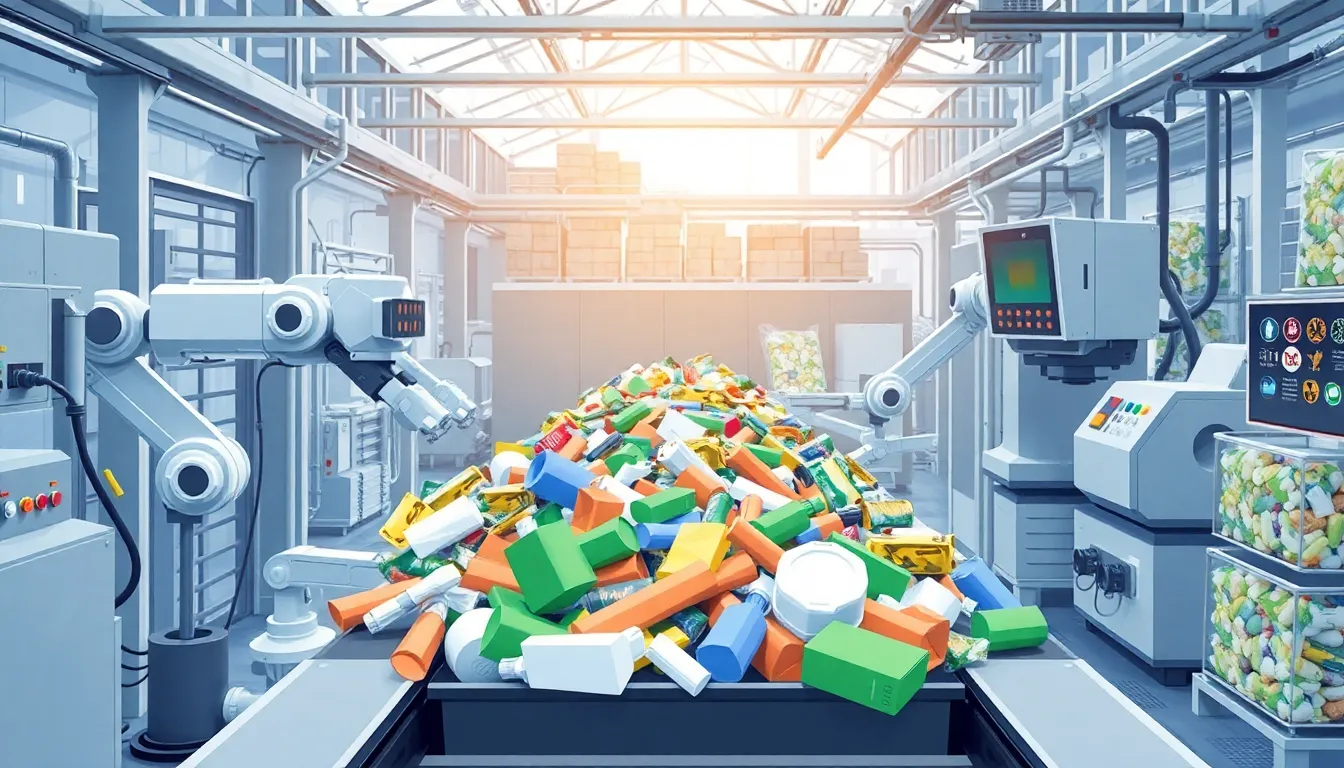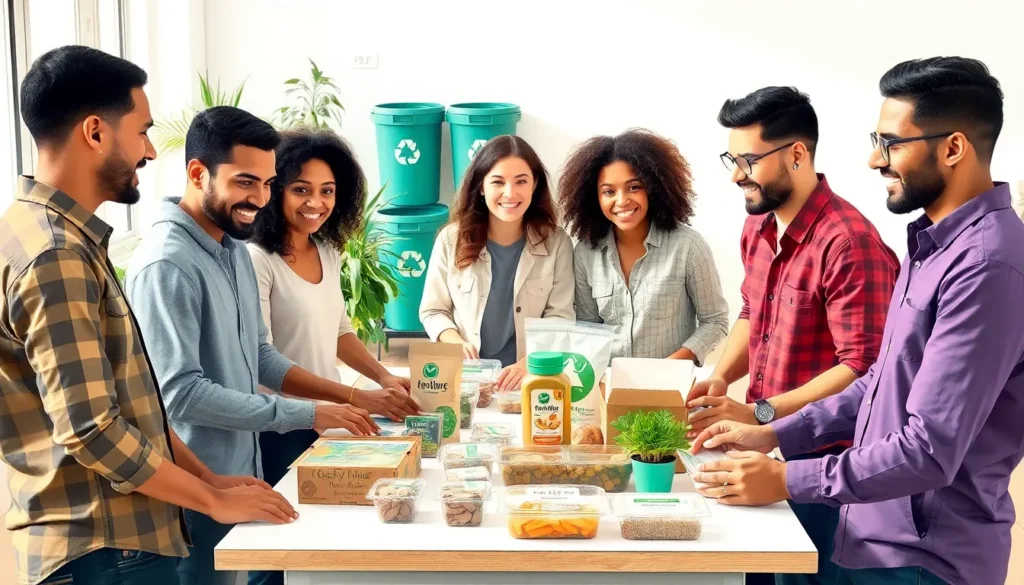In a world drowning in plastic and overflowing landfills, zero waste innovations are like superheroes swooping in to save the day. These clever solutions not only tackle the waste crisis but also make sustainability feel like a fun challenge rather than a chore. Imagine a future where trash is a thing of the past and creativity reigns supreme.
From edible packaging to compostable electronics, these groundbreaking ideas are turning the concept of waste on its head. It’s not just about reducing what goes in the bin; it’s about rethinking how we create, consume, and live. So buckle up and get ready to explore the quirky and inspiring world of zero waste innovations that could change the planet one brilliant idea at a time.
Table of Contents
ToggleOverview of Zero Waste Innovations
Zero waste innovations play a crucial role in addressing issues related to plastic pollution and landfill waste. Various creative solutions emerge, shifting perspectives on waste management. Edible packaging exemplifies how products can be both functional and environmentally friendly. This innovative idea reduces plastic reliance while offering a viable alternative for businesses and consumers.
Compostable electronics further showcase advances in sustainable technology. These devices break down naturally, minimizing electronic waste and its harmful impacts on the environment. Organizations increasingly adopt these innovations, recognizing the benefits for both their operations and the planet.
Another noteworthy approach involves upcycling materials that would typically become waste. Transforming discarded items into new products not only reduces landfill contributions but also encourages creative reuse. Companies that embrace this strategy often inspire customers to think differently about materials and consumption.
Organizations dedicated to sustainability develop zero waste innovations across various sectors. Retailers introducing refillable packaging options support customers in reducing single-use items. Some restaurants implement programs for composting food waste, turning what would be discarded into valuable resources for gardening or animal feed.
Investments in research also fuel the growth of zero waste technologies. Scientists and entrepreneurs collaborate to uncover new materials that are biodegradable or recyclable. This ongoing quest for advancements highlights a commitment to reducing environmental harm while promoting a culture of sustainability.
Through these innovations, industries can minimize waste and cultivate a more sustainable future. Each initiative contributes to a larger movement focused on reducing environmental impact and fostering creativity in waste management solutions.
Key Innovations in Waste Management

Innovations in waste management are essential for advancing zero waste goals. Several practices and technologies are emerging to transform how societies handle waste.
Circular Economy Practices
Circular economy practices emphasize resource efficiency and sustainability. Businesses adopt closed-loop systems, where products are designed for reuse and recycling, reducing overall waste. Companies like IKEA and Unilever implement take-back programs, allowing consumers to return products for refurbishment or recycling. This approach fosters collaboration across industries, encouraging knowledge sharing and innovative design. By minimizing reliance on virgin materials, these practices mitigate environmental impact and support a sustainable future.
Smart Waste Sorting Technologies
Smart waste sorting technologies revolutionize the way waste is processed. Automated systems utilize AI for accurate waste classification, significantly increasing recycling rates. For example, companies like ZenRobotics develop robotic systems that precisely identify and separate recyclable materials. These technologies reduce human error and enhance the efficiency of sorting facilities. Additionally, real-time data collection allows for improved waste management strategies, ensuring that resources are effectively utilized. As smart waste solutions evolve, they pave the way for more sustainable urban environments.
Sustainable Materials and Products
Sustainable materials and products play a crucial role in zero waste innovations. These innovations reduce environmental impact while promoting resource efficiency.
Biodegradable Alternatives
Biodegradable alternatives offer a significant solution to plastic waste. These products are designed to break down naturally, reducing landfill contributions. For instance, packaging made from plant-based materials can decompose within months rather than years. Innovations in this area include shopping bags and food containers that enhance sustainability. Companies are actively developing materials such as polylactic acid (PLA) to offer eco-friendly choices. Utilizing these alternatives not only supports zero waste goals but also encourages consumers to opt for environmentally responsible products.
Upcycled and Recycled Materials
Upcycled and recycled materials present exciting opportunities for sustainable manufacturing. By converting waste into new products, industries effectively reduce resource consumption. An example includes fashion brands that create clothing from recycled plastics or upcycled fabrics. This process diverts materials from landfills, promoting creative reuse. Engaging in upcycling fosters an innovative mindset and encourages companies to think outside the box. Brands championing this approach demonstrate that waste can transform into valuable resources, positively impacting both the environment and the economy.
Community Initiatives
Community initiatives play a crucial role in fostering zero waste practices. Through collaborative efforts, residents promote sustainability and engage in transformative activities that benefit the environment.
Grassroots Movements
Grassroots movements inspire local communities to adopt zero waste lifestyles. Community members organize clean-up events and initiatives that encourage responsible waste disposal. Local groups, such as trash-to-treasure swaps, allow participants to exchange items instead of discarding them. These movements build connections among residents, fostering a culture of recycling and reuse. Participants often share resources and tips on sustainable practices, amplifying their impact. Engaging local businesses further strengthens efforts, as shops often support these initiatives by reducing packaging or offering discounts for reusable containers.
Educational Programs and Awareness Campaigns
Educational programs raise awareness about the importance of zero waste goals. Schools and organizations develop workshops focused on waste reduction techniques, recycling methods, and sustainable practices. These programs actively involve students, motivating them to adopt eco-friendly habits from a young age. Awareness campaigns utilize social media and local events to spread the message about sustainability. Communities often host informational sessions highlighting innovative solutions to waste management. Providing access to resources equips individuals with the knowledge to make informed choices that align with zero waste principles.
The Future of Zero Waste Innovations
Emerging technologies are set to redefine waste management. Innovations such as edible packaging and compostable electronics gain traction, showcasing their potential to minimize environmental impact. Businesses increasingly adopt sustainable practices, creating products that break down naturally and reduce reliance on traditional plastics.
Among the exciting developments, upcycling is revolutionizing how materials are reused. Discarded items transform into new products, prompting companies to rethink their waste strategies. This creative reuse not only lessens landfill contributions but also inspires consumers to adopt sustainable habits.
Retails are rolling out refillable packaging, encouraging responsible consumption. Many restaurants actively compost food waste, demonstrating commitment to zero waste principles. Research investments drive the growth of biodegradable materials, with scientists discovering novel solutions that will benefit the environment.
Innovative practices support zero waste goals, enabling companies to establish closed-loop systems. IKEA and Unilever lead with take-back programs that minimize reliance on virgin resources. These initiatives demonstrate collaboration across industries, highlighting the importance of shared responsibility in reducing waste.
Smart waste sorting systems utilize AI technology to enhance recycling efficiency. Automated processes from companies like ZenRobotics improve waste classification, significantly decreasing human error. Such advancements streamline operations in sorting facilities, contributing to sustainable urban development.
Plant-based packaging options emerge as viable alternatives that help reduce environmental footprints. Eco-friendly materials like shopping bags and food containers support zero waste initiatives. Several fashion brands are also embracing sustainable manufacturing, crafting clothing from recycled or upcycled materials, further promoting creativity in waste management.
Community initiatives play a crucial role in shifting attitudes toward zero waste lifestyles. Grassroots movements inspire individuals to engage in local efforts, such as trash-to-treasure swaps. Educational programs, including workshops in schools, foster awareness about sustainable practices and equip residents with the knowledge to reduce waste effectively.
Zero waste innovations are paving the way for a more sustainable future. By embracing creativity and technology, society can significantly reduce waste and its harmful effects on the environment. The rise of edible packaging and compostable electronics highlights the potential for functional yet eco-friendly solutions.
Community initiatives and educational programs empower individuals to adopt zero waste practices. As more businesses implement sustainable methods and circular economy principles, the movement towards a waste-free world gains momentum.
Investments in research and collaboration among scientists and entrepreneurs will continue to drive advancements. The future holds promise for innovative waste management solutions that not only minimize environmental impact but also inspire a culture of sustainability.




